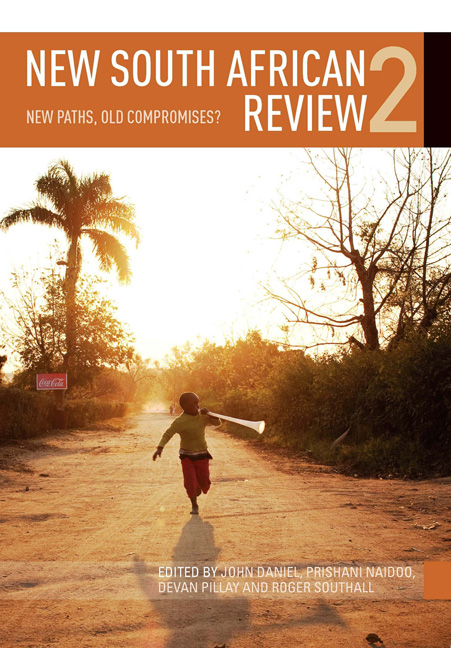Book contents
- Frontmatter
- Contents
- Preface
- Introduction: New paths, old (com)promises?
- PART 1 POLITICS AND INTERNATIONAL
- PART 2 ECONOMY AND SOCIETY
- PART 3 ENVIRONMENT
- PART 4 MEDIA
- Introduction: Media transformation and the right to know
- Chapter 17 The print media transformation dilemma
- Chapter 18 The South African Broadcasting Corporation: The creation and loss of a citizenship vision and the possibilities for building a new one
- Contributors
- Index
Chapter 17 - The print media transformation dilemma
from PART 4 - MEDIA
Published online by Cambridge University Press: 23 March 2018
- Frontmatter
- Contents
- Preface
- Introduction: New paths, old (com)promises?
- PART 1 POLITICS AND INTERNATIONAL
- PART 2 ECONOMY AND SOCIETY
- PART 3 ENVIRONMENT
- PART 4 MEDIA
- Introduction: Media transformation and the right to know
- Chapter 17 The print media transformation dilemma
- Chapter 18 The South African Broadcasting Corporation: The creation and loss of a citizenship vision and the possibilities for building a new one
- Contributors
- Index
Summary
In 2010, legal academic Pierre de Vos argued that ‘transformation’ had become an empty and hollow word devoid of any meaning, captive to an elite (black and white) which, in reality, actually fears the real and deep transformation that would threaten their grip on wealth. De Vos went on to argue: ‘Maybe we should ban anyone from using the word and find new words to talk about the need to change this country’ (De Vos, 2010). Critics of the ‘T’ word, including De Vos, have directed much of their ire at black economic empowerment (BEE) as a driver of transformation. Since 2008, prominent public intellectuals, including President Jacob Zuma, have criticised BEE's tendency to empower the few while failing to raise the living standards of the many (see Lindsay in this volume; Cargill, 2010; Mbeki, 2011; SAPA, 2011). Transformation has also been criticised as a veil behind which the ruling African National Congress (ANC) hides an intention to extend its control over all aspects of state and society. But dismissing the term outright is not an option either, as it could allow existing power relations to remain unchallenged. In the absence of an alternative word, the challenge for all those committed to a true transformative vision is to struggle for a definition of transformation that captures this vision, rather than one which allows racial apartheid to be replaced by class apartheid.
Print media transformation, or the lack thereof, became a particularly contentious issue from 2009 onwards, fuelling suspicions in media circles that the ‘T’ word had reared its head because newspapers were being rather too effective in exposing the shenanigans of the (mainly black) elite, and the ANC wanted to reign them in. Yet, there are clearly substantial concerns about the extent of print media transformation. According to a research report into print media ownership and control, commissioned by the Media Development and Diversity Agency (MDDA) in 2009, ‘in post 1994 South Africa, the print media landscape has not transformed much in terms of ownership and control and is still majority owned and controlled by white shareholders. In spite of various interventions by the state through promotion of transformation processes and BEE, the majority of print media in South Africa is still owned or dominated by a few companies and individuals’ (MDDA, 2009).
- Type
- Chapter
- Information
- New South African Review 2New paths, old compromises?, pp. 345 - 368Publisher: Wits University PressPrint publication year: 2012

